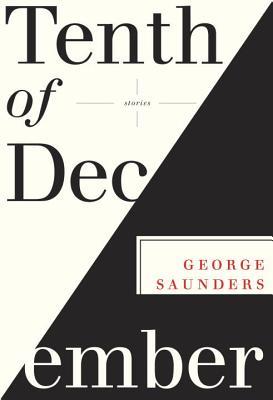
Most students would be too afraid to write for a living. New York Times bestselling author George Saunders felt the same fear. Saunders sat down to share the story of his success with staff writers Marissa Block and Jessica Kotnour.
As a child, Saunders believed that the people behind all books was a group made up of “six people in New York.”
Now that he has appeared on Late Night with David Letterman, the cover of The New York Times Magazine, and won the McArthur Fellowship award, known as “the genius award,” he has finally become one of those six people.
Growing up in Oak Forest, IL, a suburb of Chicago, Saunders did not know any writers and never viewed writing as anything more than a hobby. It wasn’t until he returned from working in the oil fields in Asia that Saunders became serious about writing.
“When I was in Asia I went swimming in this river, and there was monkey poop in it,” said Saunders. “I got really sick and came home.
“I was working part time jobs living with my aunt and then it wasn’t really a decision, but it was ‘I have nothing else going on. I really love [writing], maybe I should start thinking about it as a career.’”
When Saunders first began writing, he mimicked his favorite author at the time, Hemingway.
“All through college I read him and loved him. I think I loved the adventure more than [his books]. I loved the way he lived, traveled, went to wars, so for a young guy that was cool. I don’t think I understood what his writing was all about, but I liked the way he lived,” said Saunders.
Other influences included Raymond Carver, Tobias Wolfe, and Isaak Babel. Saunders met Wolfe while studying at Syracuse, where the former now teaches.
“[Wolfe] is a great short story writer, and he’s a great person, and I was like ‘Really?’” said Saunders. “I thought that in order to be a writer, you had to be a maniac, a drunk, or something crazy, and Toby was just a real steady father.”
Saunders soon realized that you cannot write solely by miming. “You get to the end of your rope and you’re like ‘God, my life is different. My life has got things in it that their life didn’t. My mind has things in it that their minds didn’t. I have to find a unique style in which to express it.’”
Once coming to that realization, there was only one obstacle left for Saunders to overcome: the logistics. While involved in a long term relationship with his family and a job, Saunders still found a way to keep the flame burning with his life-long crush, writing.
“I played in bands [but] it never lit me up the way writing did. There were a couple times when it’s like you have a crush on somebody and they aren’t responding. The crush is still there but at times you go ‘oh forget it’ and you try not to think about the person. I had a big crush on writing,” said Saunders.
This crush on writing turned out to be more than a one night stand and has brought him fame in his own profession, which, according to Saunders, isn’t much.
“Writer David Foenkinos said ‘the most famous writer in the world is about as famous at the local TV weatherman, just as recognizable,’” recalls Saunders.
Saunders is known for his collections of short stories that satirize everyday life. In the novel Pastoralia, Saunders brings readers into a theme park where humans live and act as cavemen, which doesn’t seem too foreign from attractions such as The Holy Land Experience and Walt Disney World.
In his most recent publication Tenth of December, a collection of short stories, Saunders continues his satirization of life as we know it. He points out the extremes that we all go through just to fit in, even if we end up worse than before.
Another common target of Saunder’s satire is the media, but due to his rise in fame he now has an insider’s view.
“The Colbert report says ‘Do you want to be on?’ and when I first heard that I really [didn’t]. It makes me nervous. Then I kind of [felt] like I needed to man up and do this. Also, there is potential to sell more books if you do it. You seem like a crazy person to turn down an opportunity like that,” said Saunders.
Saunders seemed excited for the opportunity to get to the root cause of what he refers to as “media stupidity.”
“If you’re going to criticize something, it makes sense to understand it at its best form, at its highest level. What I’m calling ‘media stupidity’ actually has a lot of intelligent components. For example, the people doing it are incredibly smart, incredibly well educated, and incredibly well read.”
Saunders went on to ask the big question: Why does it tend to be so dumb?
“You get in there and they say, ‘We love having writers on the show.’ They aren’t really diabolical, but they have to play the ratings. They’d be happy to have writers [and] intellectuals on, but most of them are snoring; most writers aren’t entertaining enough,” explained Saunders.
Another issue that Saunders pointed out in the media is its focus on rapidity.
“They have this premium on quickness,” explained Saunders. “On Letterman, for example, they have to get a laugh every few seconds and that doesn’t happen randomly. Therefore they prep you like crazy before you go on, [and] it takes a lot of the spontaneity out of the whole thing.”
But Saunders should be used to quickness. His fast-paced stories seem fit to be a script for a new movie. But will that happen anytime soon?
“We’ve had a couple close calls but nothing yet.” He then went on to say that while writers never reach a very high level of fame, a movie could reach out to many.
His stories also seem ready for the big screen due to the way that Saunders is able to bring the reader into the character’s mind, leaving behind traditional rules of grammar and usage. Saunders refers to this as “3rd Person Ventriloquist.”
“The traditional way might be to say ‘Frank walked down the street. He was having a bad day because he was breaking up with his girlfriend. He often thought..and so on.’ At that point, I will take a step closer to him and start using his diction and that puts the reader in a straight jacket because if you want to keep reading you have to be thinking about the story from that guy’s point in his words. I love doing that. It’s so silly and wild. ”
Saunders attributes this style of characterization to his childhood. “In Chicago, we did a lot of joking; we used to love all those 70s comedians and impersonators. There was always some kid [in high school] who could do a really good impression or present a character and do his or her voice, and also kind of be the personality,” said Saunders.
By the energy in his voice, one could tell that Saunders loves entering the made up minds of his characters. This is one of the reasons that fiction is so appealing to him. “I like the part of fiction where you just make up the whole thing. I’ve written a couple pieces where you go and you hang out with people, and I hate writing about people that [I] know.”
He has written a few nonfiction pieces, including one told about his first encounter with the clash of race and class in Chicago.
“I was a roofer in 1984, and I must have written this piece twelve years later. These guys on the roofing crew did a mean trick to the black guy that worked there. There was a Christmas party. This one guy kind of tricked this guy, not only out of his paycheck but his bonus check. He had [many] kids and had to go home that night on Christmas Eve with no money because his co-worker had won it from him, but he had done so in a tricky way, so I wrote about that.”
The roofers that Saunders wrote about read the piece. “It really made them mad. At one point they were supposed to come and roof my aunt’s house and they refused. I really didn’t like that feeling at all, partly because I don’t like conflict,” said Saunders.
“With fiction I can be as naughty or as angry or as crazy as I want. Because the objects of the story are invented, nobody gets hurt. I tend to be a little more honest and a little more wild in fiction because of that,” said Saunders.
These connections that Saunders makes to his life are connections that we all can make. These connections act as bridges, inviting readers to think about their own lives.
“I want to compel the reader to stay in the story,” said Saunders. “The main thing for me is to entertain. If you’re reading, and you go ‘eh’ and shut the book, then nothing else is happening. There’s no theme; there’s no politics.”
Humor is a tool that Saunders uses regularly to make sure that readers don’t shut the book.
“For me, part of the entertainment is humor for sure,” said Saunders. “That’s kind of a go to for me. If the energy starts to fade, I can feel myself looking around for something funny to work into it.”
Since becoming an English professor at Syracuse University, Saunders has been exposed to a variety of writing. He currently has the task of reading 566 applications for 6 spots at a Syracuse graduate program.
“The thing that I find that I’m looking for is somebody who is telling a story that I can’t look away from,” said Saunders. “Often that means that there is a very intelligent person on the other side of the product who really has something to say and who isn’t afraid to make it interesting.”
Saunders is drawn to writing that is interesting and invites the reader to journey through the story. He tries to bring these same aspects into his writing.
“It’s much better to go into the story thinking ‘I have no idea what this is going to give out,’” said Saunders. “It’s almost like if you go on a date and you brought along index cards. Seven o’clock
—compliment his outfit; 7:15—ask about his parents; 7:20—
ask about his career. You would never run out of things to say, but he would have the feeling that you weren’t really there.
“I think for a writer the same thing [is true]. If you think ‘Well, this story is about the Bush administration’ then you have already told the reader to shut up and take it. You push the reader away from the table. But if you say ‘I had this image that was kind of compelling. Let me just start messing with that. Dear reader, you come over here with me and we will look at it together.’ So you’re respecting the fundamental energy of the story. That’s a respectful relationship with the reader.”
While we are taught at school that authors have a perfect idea of the future plotlines of all their books, Saunders said, “The assumption is the writer knows from the beginning exactly what she’s trying to do and she puts in all these tricky symbols and bells and whistles. And that is so not the case for any authors that I know.”
This uncoordinated style goes past the words on the pages.
Saunders said, “At school we are taught the metaphorical meaning of the title, but for the actual artist a lot of it has to do with what I like best, what makes me happy, what gets me excited.”
The time that Saunders put in to his works has certainly paid off. His work has opened many doors for him and has given him access to people and places that most people never get the chance to see.
“I did pieces for GQ and went to Dubai, Nepal, drove the whole Mexican border, lived in a homeless camp for a week, [and] went to Africa with Bill Clinton. You find yourself doing really crazy, deep things, scary things that you would not have the excuse to do in everyday life. If something was dangerous or humiliating, you still had to do it because you’re trying to get data. Your job is to be open and curious, to put yourself at risk.”
One might think that a life of writing could get boring after so many years, but Saunders feels the opposite.
“When you get into something that you love and its hard, and then you do it as long as I’ve done it, it gets to be unbelievably deep. It’s so pleasurable and so satisfying to do it. It’s like a vocation. You go deeper and deeper into the basement of this incredible mansion and so it makes me feel happy. It’s just gotten more and more interesting and harder. Writing and real life have gotten so much closer. The things I’m worried about and thinking about in real life are now making their way into my stories, which is deeply, deeply pleasurable.”
And now his life-long crush checked yes. Throughout their relationship, they’ve had some hardships but it seems until death do they part.
“I didn’t know that [writing, like] marriage can be an incredibly beautiful deepening thing that gets more and more wonderful as you get older.”

























